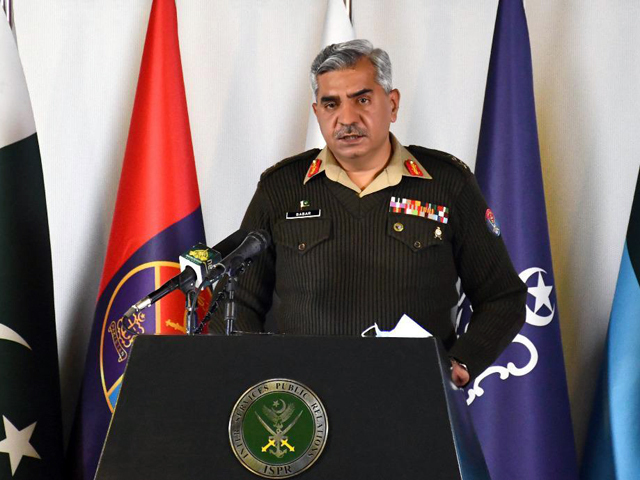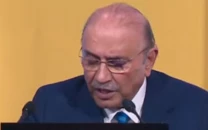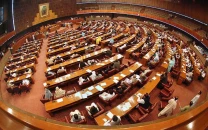Military to ‘offer PDM chai-pani’ if they come to Pindi
DG ISPR says military is a state institution, it has no backdoor contact with anyone

While regretting attempts to drag the security institutions into politics, the chief military spokesperson has said that they would offer “chai-pani” to leaders and supporters of the Pakistan Democratic Alliance (PDM) if they come to Rawalpindi as has been indicated by the head of the alliance of 11 opposition parties.
He also dismissed a media guessing game about any behind-the-scene efforts by the military to lower the rising political temperature in the country. “The military is a state institution and it has no backdoor contacts with anyone,” said Maj Gen Babar Iftikhar, the director general of the Inter Services Public Relations (ISPR), while addressing a media briefing on Monday.
The briefing was organised to give the media a comprehensive review of efforts in the security domain over the last 10 years. He was asked about a statement from Maulana Fazlur Rehman, chief of his eponymous faction of JUI and president of PDM, who has said that the opposition alliance, which is planning to march on the capital in its attempt to topple the government, could march towards Rawalpindi instead.
Rawalpindi is where the General Headquarters (GHQ), the military headquarters, is located. The PDM has been trying to pile up pressure on the military to withdraw its support from the Imran Khan government – something it is constitutionally required to do.
“I don’t see a reason for [PDM] coming to Pindi. If they want to come, we will offer them ‘chai-pani’ and look after them. This is all I would say,” the military spokesperson said in his tongue in cheek response triggering a coordinated smile from the audience.
Asked about the military’s silence vis-à-vis unprecedented criticism of the security institutions by some opposition leaders, Maj Gen Babar Iftikhar said: “The military would have responded if there was any truth in it. There is not truth in these allegations. We haven’t got involved and we would not get involved either [in such controversies].”
He reiterated that the military has rendered sacrifices and would continue to do so. “Alhamdolillah! We are doing our job and would continue to do so. As I said, we have stayed the course and we’ll stay the course. The morale is high, not just of the army but of the families of all our martyrs,” he added while dismissing the speculations that criticism from politicians could dampen their morale.
He clarified that concern about the allegations was there in the military, but it is a state institution and the government has effectively responded to it. “The military had supervised the 2018 general elections on the instructions of the [interim] government with all honesty. If anyone has reservations, he can approach relevant institutions for redressal,” he said, adding that the military didn’t want to get involved in political matters and it should not be dragged in either.
Also read: PDM decides to contest by-polls, defers decision on Senate election
Maj Gen Iftikhar also addressed a question about the fencing of the Pak-Afghan border which, according to the questioner, some elements were threatening to demolish. “We haven’t erected the fence on our own. It was erected on the international border on the instructions of the Pakistan government for the protection of its people. And Alhamdolillah, we have already started receiving dividends,” he said.
The military spokesperson revealed that the military has given countless sacrifices during the border fencing operation. “It was not an easy undertaking. We have cemented this fence with the blood and sweat of our soldiers. Nobody can dare pull down this fence. Insha Allah,” he added.
The military spokesperson dismissed India’s threats of cross-border or cross-LoC attacks, which it calls “surgical strikes” as something the Indians do to boost their morale. “We know what the capability is. We also know the intentions. We are absolutely ready for that. Even they [Indians] know that,” he added.
However, he regretted that the Indians were increasingly targeting civilian populations, including women, children and elderly, on the Pakistani side of the LoC. “That is the reason security of the population along the LoC is a major concern. With this in view, the government has allocated massive funds to build protection bunkers in every house of the community.”
He assured that civilian casualties on the Pakistani side of the LoC would go down significantly in 2021, though a drop has already been witnessed in 2020.
Maj Gen Iftikhar also spoke about a dossier of India’s sponsorship of terrorism in Pakistan that Islamabad has shared with the international community. “The world is taking it seriously. While the dossier news was still fresh, the EU Disinformation Lab expose happened. It is a clear evidence [of how India has been running a global campaign against Pakistan.”
Also read: Revelations of Indian disinformation campaign create ripples amongst freedom rights supporters
He added that the world was talking about it. “India might try as it is currently doing to deny it. As I said even if muted, truth prevails – and it has always prevailed. If you look at the international media, even the tickers about India are changing now,” he added.
Referring to India’s military technology-buying spree, Maj Gen Iftikhar said the international community should ensure conventional balance in the South Asian region. “Because if this balance tilts, then things will enter another domain which no one can afford,” he said.
He sought to downplay the presence of the Islamic State, or Da’ish, in Pakistan. “We have shared evidence of foreign support to Da’ish to set up a Pakistan franchise. They are there [in Pakistan], but their presence is not much,” he added. “Splinter groups of different outfits use the Da’ish name for credibility. They would not be allowed to establish a foothold in Pakistan.”
Da’ish has claimed responsibility for the slaying of 11 coal miners from the Hazara community earlier this month in the Machh area of Bolan district, Balochistan. The grisly massacre led to a week-long protest sit-in by the bereaved community in Quetta.
The military spokesperson said that Da’ish does have a footprint in Pakistan, but their infrastructure is somewhere else. He was referring to the Khorasn franchise of Da’ish which is operating out of Afghanistan with the financial support of Indian spy agency RAW.
“We have repeatedly taken up this issue with Afghan authorities. And the good thing is there is positive acceptability on both sides. At the same time, we also know that there is a capability issue on the Afghan side,” he added. “We will keep pursuing military-to-military and government-to-government contact to take on the Da’ish infrastructure.”
Asked about the recent attacks on civilians, especially in Balochistan and erstwhile Fata, he said he would not agree that there was an uptick in terrorist violence in the country, especially high-impact attacks. “Balochistan is huge province and it is not possible to deploy a soldier everywhere. But we will ensure the security there because Balochistan is the future of Pakistan. This is how the government is looking at it.”
Maj Gen Iftikhar listed myriad of challenges that Pakistan had to face during the last decade including terrorism, coronavirus epidemic, locust infestation and India’s hybrid warfare.
The achievements of the entire decade were consolidated through Operation Radd-ul-Fasad through a whole of nation approach, he said. “The operation largely eliminated terrorist support bases, including facilitators, abettors and financiers, and illegal weapons and ammunition,” he added. “Alhamdolillah, today, there is no organised terrorist infrastructure in Pakistan.”
He said more than 371,000 – 371,173 to be precise – intelligence based operations were conducted under Operation Radd-ul-Fasad (since Feb 22, 2017). More than 72,000 weapons, 5 million rounds of ammunition and 449 tonnes of ammunition were recovered.
“If the manifestation of success is examined on a scale, it will be seen that in 2007/2008, only 37% of the territory in the tribal districts remained under the state control. Today, all the tribal districts have become part of Khyber-Pakhtunkhwa.”
Major terrorist incidents have come down by 45% compared to 2019, while the number of terrorist incidents dropped from an average of 90 per year in 2013 to only 13 in 2020. Last year, the law enforcement agencies neutralised more than 50% of terrorist threats across the country.
“If we look at the casualties in terrorist incidents over the last two decades, there were 414 casualties in 2013, while in 2020 there were 98 casualties,” he said. “Similarly, there has been 97% reduction in suicide attacks.”
In 2014, Karachi was ranked sixth on the global Crime Index, but its ranking has improved to 103 on the list in 2020, he added. Karachi has seen a 95% reduction in terrorism, 98% in targeted killings, 99% in extortion and 98% in kidnappings for ransom.
Maj Gen Iftikhar said: “The enormity of the challenge was decidedly overwhelming. But with Allah’s help and resolute support of our nation we took it on. We took many hits on the way. We didn’t relent. We didn’t budge.”
“During these testing times we have come a long way as a nation, as a society, as a military. The challenges we overcame have now given way to great opportunities,” he added. “We are not out of the wood yet, but we are almost there, Alhamdolillah. More importantly during all this, we have stayed the course and we will stay the course, no matter what.”



















COMMENTS
Comments are moderated and generally will be posted if they are on-topic and not abusive.
For more information, please see our Comments FAQ